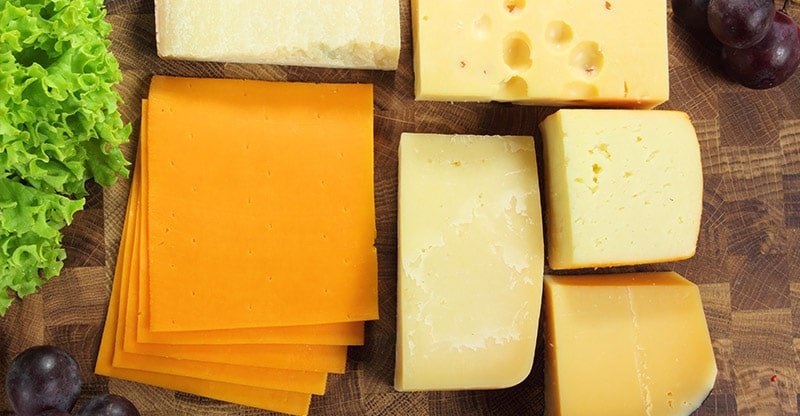If you have recently been diagnosed with Celiac Disease, or are trying to follow a gluten-free diet for health reasons, you are probably a bit overwhelmed by all the dietary changes you are facing. As you think through your new diet, it may be tempting to think that cheese is one food that you can safely eat. Is cheese gluten-free? Well, unfortunately, even cheese and cheese products can contain gluten, or can be a target for cross-contamination with wheat or gluten.
Not all brands or kinds of cheese are gluten-free. So, here is some information to help you make informed choices about adding cheese to your gluten-free diet.
Cheese that is Labeled Gluten-Free
These days, many companies make it easy for their gluten-free consumers, and clearly label their cheese products as gluten-free. These companies include Sargento, Boarshead, Kraft, Cabot and Organic Valley, and provide comprehensive information about their gluten-free products on their company website. Even better, these companies offer a wide variety of cheeses to choose from. Organic Valley has over 30 kinds of gluten-free cheese including American Singles, Baby Swiss, Blue Cheese Crumbles, eight types of Cheddar, Feta, Raw cheese, Italian and Mexican blends, Ricotta, three kinds of String cheese, Provolone and Pepper Jack. As the gluten-free food industry continues to grow, it is becoming easier and easier to pick up these types of products at your local grocery store.
The packaging for gluten-free cheese is also very secure, using high quality vacuum packaging that keeps the cheese from coming in contact with other products during distribution from the cheese factory to the grocery store.
Cheese that is not Labeled Gluten-Free
If the packaging does not say gluten-free, then you will need to carefully read the ingredients on the label before purchasing. As a rule, cheese with fewer ingredients has a better chance of being gluten-free. A natural’ cheese, like Swiss or Jack, may contain only three ingredients: milk, salt, and enzymes, which means that it contains no gluten.
Processed cheeses, on the other hand, like American cheese usually include several different kinds of natural cheeses, like Colby, Cheddar or Jack, and stabilizing emulsifiers, as well as butter, milk, milk protein concentrate, and whey powder. Processed cheeses might also use artificial colors and preservatives, which may contain gluten. Artificial color and stabilizers or thickeners often contain trace amounts of gluten, so should be avoided. Manufacturers are getting better at clearly identifying wheat based products, so you may even see wheat’ listed on the ingredients, making this unsuitable for a gluten-free diet.
Shredded and grated cheeses can also be a potential problem, since the cheese may be lightly covered in starch, which may be wheat-based, or corn or potato. Again, be sure to read the label carefully for any wheat starch.
Cottage Cheese

Cottage cheese often contains some type of modified food starch’ as a thickener, to make it creamy and hold together. In the past, there was no way to tell if this food starch was wheat, corn or potato-based, which gave many people the impression that cottage cheese was not appropriate for a gluten-free diet. But lately, many companies are being much more specific about the type of food starch that they are using, and properly label the ingredients. The FDA now requires that any starch that comes from wheat must be clearly identified, therefore, if you do not see a statement alerting you to wheat as an ingredient, or that it was processed on equipment that also processes what products, then the cottage cheese is gluten-free.
Deli Cheese
If you are a cheese connoisseur, you probably love going to the cheese deli, for imported products from France, Switzerland, Germany and other countries with a passion for cheese. Unfortunately, deli cheese presents significant problems for those following a gluten-free diet. Blue cheese like Roquefort or Stilton, contains mold that may be grown on rye or in a wheat-based environment, and it’s nearly impossible to tell if this is the case. So, blue cheese products must be avoided.
Another concern with deli cheese is that it is typically created as a large wheel of cheese and sent to the deli that way. The deli personnel then cut the cheese up for customers, and individually wrap them on-site. This process may introduce cross-contamination from bread and crackers also sold in the deli, or through a knife that is used to slice bread before cutting the cheese wheel. The plastic wrapping may have been used previously to wrap sandwiches, introducing bread crumbs along the way. Therefore, you must be extremely careful when selecting deli cheeses. Cheese that is wrapped at the factory is generally preferred for those on a gluten-free diet.
Another trend for deli or artisanal cheese is beer-washed’ cheeses or washed-rind cheeses that are ripened with beer. Beer, of course, contains gluten, so even though this is an upcoming trend for cheese lovers, it is one that those of us on a gluten-free diet cannot share.
Spreadable Cheese
Philadelphia brand cream cheese is gluten-free, so you can use this as a base to make all sorts of gluten-free spreads. Some ideas include covering a block of cream cheese in jalapeno pepper, or chutney and serving this with rice crackers. It can also be used to make an excellent vegetable dip, by adding herbs, paprika and salt to taste.
Laughing Cow’s wedge cheese products are all gluten-free, including their Creamy Original Swiss, Creamy Queso Fresco Chipotle, and Creamy Garlic and Herb. These individually wrapped servings make a great afternoon snack with almonds or gluten-free crackers.
But, other spreadable cheeses like Boursin, cannot confirm that ingredients that are used in their product are not cross-contaminated by their suppliers. So, again, there is little way of knowing if these products are gluten-free.
Hopefully this article has provided you with some guidelines, and delicious choices for adding cheese to your gluten-free diet.
Sources
- http://celiacdisease.about.com/od/GlutenFreeSnacks/f/Is-Cheese-Gluten-Free.htm
- http://www.glutenfreegluten.com/cheese/
- http://www.organicvalley.coop/products/gluten-free-products/
- http://www.emaxhealth.com/12410/cheese-gluten-free-diet-understanding-safety-concerns-celiac-disease
- http://thelaughingcow.com/faq/
- https://www.philadelphia.co.uk/corporate-information/faq
